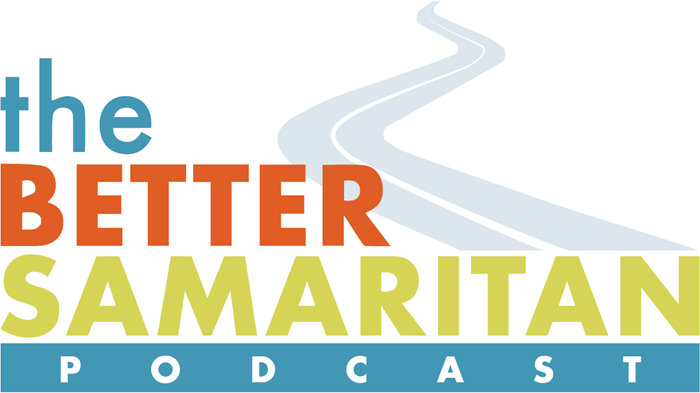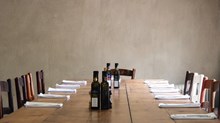How Have You Been Learning to Do Good, Better in This Work?

On the Better Samaritan, we’ve had the great privilege of interviewing many humanitarians doing critical work around the world.
To close every episode, we ask the same five questions:
-
What has surprised you in your work?
-
How are you learning to do good, better?
-
What does humility look like in your field?
-
How can we make the [Jericho] road safer for those coming in the future?
-
How do you sustain hope?
We thought it would be fascinating to to compile all the answers to each question, one after the other, in order to notice what themes emerged. (Each full episode is linked, so you can go back and listen to the ones you find interesting.)
Our guests work diverse fields: public health, racial conflict, climate change, politics, and displacement, just to name a few. Last week, we listened to a compilation of answers to our first question: what has surprised you in your work? This week, we compile our second question:
How have you been learning to do good, better in this work?
The great thing about the Great Samaritan speech is that [Martin Luther King, Jr.] says sympathy and compassion, but he’s really talking about empathy. I think the deeper you do this work, ideally, the more empathy you have for other people and people who are trying to do the same work. It's difficult, especially in the context of living in our own very tumultuous historical times. I think part of that has been being more centered. I have my own daily practice of meditation and yoga. I’m trying to be more present with my family and my personal life in addition to the professional and political responsibilities.—Dr. Peniel Joseph, black history scholar at the University of Texas at Austin (Do We Shave the Edges off of MLK?)
I’ll use my WorldVision reference frame here. WorldVision has been a learning laboratory for now seventy years. Every year the goal is to constantly improve its approaches and techniques to address root causes of poverty. We went from a model of handouts in the 1950s when WorldVision started, the idea of development was in its infancy. So what you did is if children were hungry, you gave them food. If children were orphans, you built them an orphanage. So what evolution happened over the years is that we learned from experience that the poverty wasn't going away with the handouts we were giving.
So we kept asking the question "why?" Why are these people poor, and why don’t they have these opportunities and it eventually led to a model. We started to develop expertise in each one of those things. In 1990, for example, WorldVision didn't do much microfinance at all, lending to the poor. Since then, we have a massive microfinance institution, I think we loan out about a billion dollars in loan capital every year to more than a million clients. I think since its inception we’ve given out 17 billion in loans to the poor so they can start their own businesses. But if you went back 30 or 40 years, we didn’t have that capability at all. WorldVision has now become the number one provider of clean water in the world. If you went back 30 years, we didn't know much about providing clean water, but you learn that the absence of clean water and sanitation is one of the root causes of poverty. If you don’t have water available that’s safe to drink and wash and bathe in and you don’t have a toilet, how are you going to start the next Apple computer in your village? These basic things people have to have to live, so one of the things that holds people back in extremely poor communities is the lack of clean water.WorldVision had to become a jack of all trades because poverty is not one dimensional. And I know it’s very popular for charities to just do one thing like build houses or drill wells or feed the hungry, and yet those one things don’t solve the problem. I think it’s really important for every nonprofit to be a learning organization and listen to the people they’re serving. The people you’re serving and helping probably know what they need, and it may not be what you're giving them. But they’re going to be very polite and say if you want to give me this, we’ll be polite and we’ll take it, but I wish you would listen to us, and hear what we really need. Because what we really need, we don’t know how to get it, and if you could help us do that, that would be a big thing.—Rich Stearns, President Emeritus of WorldVision (WorldVision President Emeritus Rich Stearns on Servant Leadership in the Nonprofit World)
Always just listen. You need to listen. You don't need to go with what you have. But always you need to listen and observe. Sometimes even ask questions so that you get it right while you're trying to help them.—Jean Pierre Gatera, Former refugee and pastor (Don't Underestimate Refugees in 2021. They May Be Just the Energy Your Church Needs.)
A lot of reading and a lot of humble listening. Trying to listen and center other voices and experiences than my own. Trying to take people at face value and let them describe what it's like to live in their shoes and live in their skin. And to try to not be defensive about that and not be argumentative about that and just listen and let it shape me.—Jeremy Courtney, Chief Executive Officer & Founder of Preemptive Love (Undercut the Old Narratives to Show the Love Jesus Requires)
The benefit of partnerships and the more willing you are to share credit and share burdens, the farther you're going to be able to go in general, and so my work is oriented around a mission and a way of thinking that does not require me, and if your work is oriented around a mission, then you can be happy seeing that mission advanced through your own efforts but also through the efforts of others who you can support. So that’s been the emphasis for me over the last few years.—Michael Wear, Author and founder of Public Square Strategies LLC (Loving Our Neighbor Through Divisive Politics)
The way I've been learning to do good, better is by having more curiosity about people that I initially overlooked.—Nikki Toyama-Szeto, Executive director of Christians for Social Action (The Biggest Mistake Christian Activists Make)
Professionally, I am a voracious reader. I’m constantly reading about topics I have a community of therapists in the practice. I learn from them, they learn from me. It's not solo work. I get twisted up by it. I'm up early every morning reading and studying scriptures. I like a lot of theologians that my staff refer to as “the old dead guys.” I'm just constantly seeking food early in the morning.—Therapist, expert and author, Dr. Diane Langberg (Power and Abuse in the Church)
Spending time with the people that we serve. You quickly learn that joy is not based on income. Joy is based on what’s in your heart, with your family, loved ones, and friends. I missed that during the pandemic. We're doing it virtually. It's not the same, but it does help. We’re connecting with our field staff. The silver lining is actually that we’ve been able to reach more people with technology. Because not everybody can travel to Africa or Asia or Central America, so we’re able to reach more people during this time.—Greg Allgood, VP of Water for WorldVision (One Thing Keeps Women & Children Enslaved for 200M Hours per Day, Globally)
Setting boundaries for myself, as a requirement for my ability to do my job well. Part of what I’ve realized is that when the universe’s needs are so great and you realize there are so many places you can make an impact, understanding where you should make impact becomes very difficult. It’s different than when you look at something and go, “oh, this is what I need to do.” Well there are so many things I could do, I could do seven of them, I could do five of them well, but I probably only have the ability to do three. How do you set up the guard rail to do that? I have to be very critical, and that’s also given me the ability to find space and grace to find partners who can do the things that I can't and given me the ability to elevate their very important work so that we’re cumulatively making all that impact, but not in a way that drains any one of us or our ability to fulfill our ultimate missions.—Dr. Nicolette Louissaint, Executive Director of Healthcare Ready (How Do Churches Combat COVID Misinformation?)
Every day I wake up with a decision that I'm going to enjoy the most difficult parts of my work. Every day it gets more difficult. But every day I look back on the stories of restoration, and every day I decide that tomorrow I'll be better than today. That's what I do.—Anu George Canjanathoppil, IJM expert (The Difference Between Freedom and Slavery: You)
I feel like I learn something every time I have a conversation with people or every time I give a talk somewhere and I hear questions from people. I still today, many years later, listen very carefully to the questions I get, and what I’ve been noticing over the past two years is something very interesting. No matter where I was speaking or who I was talking to, I would be getting the same two questions rising to the surface. And these two questions that everybody wanted the answer to are, “how do I talk to my family member, my friends, my classmates, my co-workers, my elected official?” and “what gives you hope?”
So listening to those two questions, I turned it around, and I started to ask people, “what gives you hope?” And I collected several hundred answers and analyzed them, and I found that what gives them hope was very similar to what gives me hope, which is knowing that there are other people doing things, that there really is a way forward, there is a better future, that the boulder isn’t sitting at the bottom of the hill with a few hands on it and they’ll never get it up hill because there aren’t enough people. The boulder is going up the hills, and there are millions of people’s hands on it, but it’s just not going fast enough. And that sense of hope is just incredibly powerful, and it connects directly to what we learn in the Bible. In Romans, it talks about the origin of hope, and it doesn’t begin with good circumstances. It doesn’t begin with things going your way. It doesn’t begin with everything being rosy and bright. Hope, according to the apostle Paul, begins with suffering, and suffering leads to perseverance, and perseverance builds character, and ultimately that is what gives us the hope that will not disappoint, because we have come to it through suffering, and our hope ultimately, of course, is placed in God.—Katharine Hayhoe, Director of the Climate Center and founder and CEO of ATMOS Research (Yes, You Can—and Should—Talk about Climate Change)
Telos has a thing called the Principles and Practices of Peacemaking. It’s a document that we worked on very hard, labored over. It’s years of work, but we really labored over it during quarantine. It has been a labor of love. It has really taught me a lot, specifically around putting language around different beliefs that I had that were kind of like “of course, of course!” It brought me a lot of joy, and it’s definitely been something that I go back to often.—David Gungor, Musician (Musician David Gungor of The Brilliance on Rediscovering Christian Imagination)
The thing that I’ve been learning most, that has given me the strength to endure as a front line worker, as a ministry worker, is staying vulnerable. I think vulnerability is a gift, transparency is a gift. There’s a quote that one of my mentors used to say that “secrecy produces more weakness.” That if you open yourself up and make known your struggles, triumphs, and your joys, and you bring all of those things together, then it gives you the ability to remain grounded. I would say that my vulnerability has been one of the things that I've leaned in most to, even with my own self care journey, taking care of myself, my family, as well as trying to show up the best of my ability to love my neighbor. The loving of self and God gives me the strength and vulnerability and courage to show up and be fully present for my neighbor. So I would just say vulnerability.—Terence Lester, Author and founder of Love Beyond Walls (How Can I Leverage How God Has Wired Me for God's Greatest Glory?)
Resources:
"On Being a Good Neighbor", sermon draft by the Rev. Dr. Martin Luther King, Jr.
This episode produced by Laura Finch
Theme Song “Turning Over Tables” by The Brilliance
Subscribe:Apple Podcasts | Google Podcasts | Spotify | TuneIn | Stitcher | RSS
Follow us on Twitter:@kentannan | @drjamieaten | @laura_e_finch
(Note to the listener: In this podcast, sometimes we'll have evangelicals, sometimes we won't. We think learning how to do good better involves listening to lots of perspectives, with different insights and understanding with us. Sometimes it will make us uncomfortable, sometimes we'll agree, sometimes we won't. We think that's good. We want to listen for correction. Especially in our blind spots.)
The Better Samaritan is a part of CT's
Blog Forum. Support the work of CT.
Subscribe and get one year free.
The views of the blogger do not necessarily reflect those of Christianity Today.






















